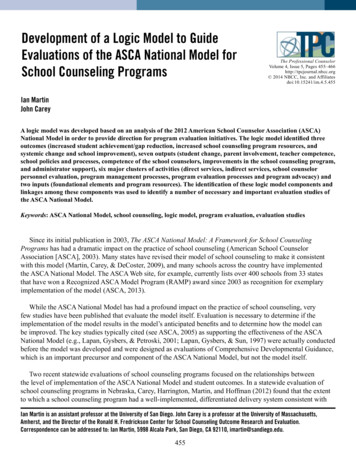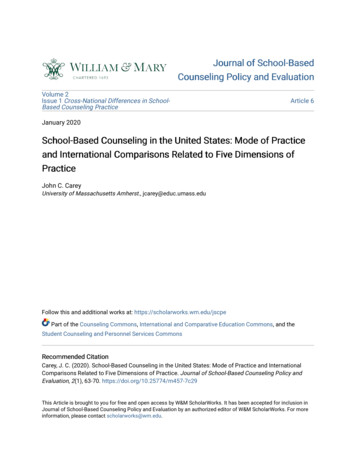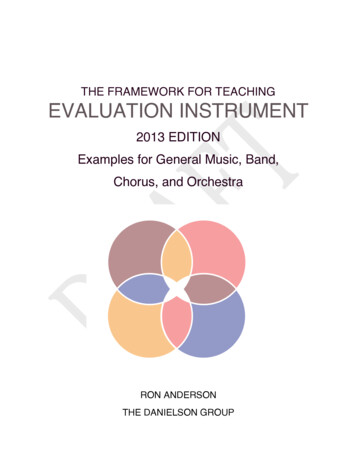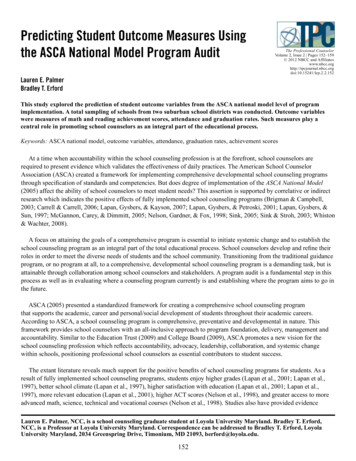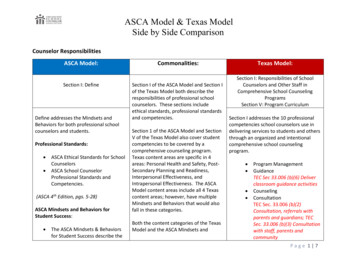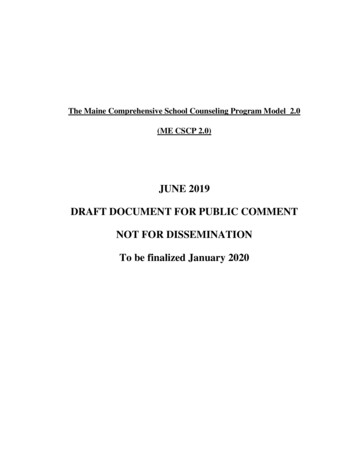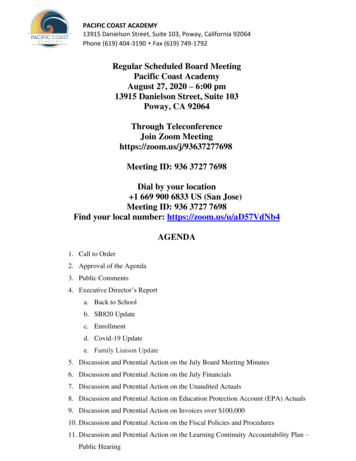
Transcription
ALIGNING DANIELSON FRAMEWORK WITH ASCA’s SCHOOL COUNSELOR COMPETENCIES AND ETHICAL STANDARDSDANIELSON FRAMEWORK – SCHOOL COUNSELORS – DOMAIN I for School Counselors: Planning and PreparationDANIELSONCOMPONENTSDANIELSON RUBRICDistinguished Level Description1a:Demonstratingknowledge ofcounseling theoryand techniquesCounselor demonstrates deep andthorough understanding ofcounseling theory and techniques.ASCA – Description of Sample Elements: School Counselor Competencies (SCC) Ethical Standards for School Counselors (ESSC)SCC:I-A-5. Understanding of individual counseling, group counseling and classroom guidance programs ensuringequitable access to resources that promote academic achievement, personal, social and emotional development;and career development including the identification of appropriate post-secondary education for every studentII-A-4. Understanding of history and purpose of school counseling, including traditional and transformed roles ofschool counselorsIII-A-2. Understanding of counseling theories and techniques that work in school, such as solution focused briefcounseling, reality therapy, cognitive behavioral therapy1b:Demonstratingknowledge ofchild andadolescentbehaviorIn addition to accurate knowledgeof the typical developmentalcharacteristics of the age groupand exceptions to the generalpattern, counselor displaysknowledge of the extent to whichindividual students follow thegeneral patterns.SCC:II-A-5. Human development theories and developmental issues affecting student success1c:Establishing goalsfor the counselingprogramappropriate tothe setting andthe studentsservedCounselor’s goals for thecounseling program are highlyappropriate to the situation in theschool and to the age of thestudents and have beendeveloped following consultationswith students, parents, andcolleagues.SCC:I-A-3. Understanding impediments to student learning and use of advocacy and data-driven school counselingpractices in closing the achievement/opportunity gapI-A-6. Understanding of: collaborations with stakeholders such as parents and guardians, teachers, administratorsand community leaders to create learning environments that promote educational equity and success for everystudentESSC:A.3.a. Professional school counselors: Provide students with a comprehensive school counseling program thatparallels the ASCA national Model with emphasis on working jointly with all students to develop personal/social,academic and career goals.Adapted from Danielson Framework with Tenets of the School Counseling Profession: A Resource for Self-Reflective Practice written by Dr. Margarita Suero-Duran and NYDOEGuidance and School CounselingDanielson Components – Enhancing Professional Practice: A Framework for Teaching, Second Edition. Danielson, Charlotte; 2007ASCA School Counselor Competencies – American School Counselor Association (2012). The ASCA National Model: A Framework for School Counseling Programs, Third Ed.ASCA Ethical Standards for School Counselors – American School Counselor Association. Revised 2010Page 1 of 8
ALIGNING DANIELSON FRAMEWORK WITH ASCA’s SCHOOL COUNSELOR COMPETENCIES AND ETHICAL STANDARDSDANIELSON FRAMEWORK – SCHOOL COUNSELORS – DOMAIN I for School Counselors: Planning and PreparationASCA – Description of Sample Elements: School Counselor Competencies (SCC) Ethical Standards for School Counselors (ESSC)SCC:I-A-1. Understanding of: the organizational structure and governance of the American educational system as wellas cultural, political and social influences on current educational practicesDANIELSONCOMPONENTSDANIELSON RUBRICDistinguished Level Description1d:Demonstratingknowledge ofstate and federalregulations and ofresources bothwithin andbeyond theschool and district1e:Planning thecounselingprogram,integrated withthe regular schoolprogramCounselor’s knowledge ofgovernmental regulations and ofresources for students isextensive, including thoseavailable through the school ordistrict and in the community.Counselor’s plan is highlycoherent and serves to supportnot only the students individuallyand in groups, but also thebroader educational program.SCC:II-B-1. Develops the beliefs and philosophy of the school counseling program that align with current schoolimprovement and student success initiatives at the school, district, and state level1f:Developing a planto evaluate thecounselingprogramCounselor’s evaluation plan ishighly sophisticated, withimaginative sources of evidenceand a clear path towardimproving the program on anongoing basis.SCC:V-B-1f. Works with members of the school counseling team and with the administration to decide how schoolcounseling programs are evaluated and how results are sharedI-A-7. Understanding of: legal, ethical and professional issues in pre-K-12 schoolsII-B-4c. Understands and practices in accordance with school district policy and local, state and federal statutoryrequirements.ESSC:A.1.b.Professional school counselors: Are concerned with the educational, academic, career, personal and socialneeds and encourage the maximum development of every studentD.1.C. Professional school counselors: Are knowledgeable and supportive of their school’s mission, and connecttheir program to the school’s missionAdapted from Danielson Framework with Tenets of the School Counseling Profession: A Resource for Self-Reflective Practice written by Dr. Margarita Suero-Duran and NYDOEGuidance and School CounselingDanielson Components – Enhancing Professional Practice: A Framework for Teaching, Second Edition. Danielson, Charlotte; 2007ASCA School Counselor Competencies – American School Counselor Association (2012). The ASCA National Model: A Framework for School Counseling Programs, Third Ed.ASCA Ethical Standards for School Counselors – American School Counselor Association. Revised 2010Page 2 of 8
ALIGNING DANIELSON FRAMEWORK WITH ASCA’s SCHOOL COUNSELOR COMPETENCIES AND ETHICAL STANDARDSDANIELSON FRAMEWORK-SCHOOL COUNSELORS - DOMAIN 2 for School Counselors: The EnvironmentDANIELSONCOMPONENTSDANIELSON RUBRICDistinguished Level Description2a:Creating anenvironment ofrespect andrapportStudents seek out the counselor,reflecting a high degree of comfortand trust in the relationship.Counselor teaches students howto engage in positive interactions.2b:Establishing aculture forproductivecommunicationThe culture in the school forproductive and respectfulcommunication between andamong students and teachers,while guided by the counselor, ismaintained by both teachers andstudents.2c:Managingroutines andproceduresCounselor’s routines for thecounseling center or classroom areseamless, and students assist inmaintaining them.ASCA – Description of Sample Elements: School Counselor Competencies (SCC) Ethical Standards for School Counselors (ESSC)SCC:I-B-5. Acts as a systems change agent to create an environment promoting and supporting student successESSC:E.2.d. Professional school counselors: Affirm the multiple cultural and linguistic identities of every student and allstakeholders. Advocate for equitable school and school counseling program policies and practices SCC:III.B.1e. Encourages staff involvement to ensure the effective implementation of the school guidance curriculumESSC:D.1.g - Professional School counselors: Assist in developing: (1) curricular and environmental conditionsappropriate for the school and communitySCC:IV-A-4. Understanding of: time management, including long- and short-term management using tools such asschedules and calendarsESSC:A.8. Professional school counselors: Maintain and secure records necessary for rendering professional services tothe student as required by law, regulations, institutional procedures, and confidentiality guidelinesAdapted from Danielson Framework with Tenets of the School Counseling Profession: A Resource for Self-Reflective Practice written by Dr. Margarita Suero-Duran and NYDOEGuidance and School CounselingDanielson Components – Enhancing Professional Practice: A Framework for Teaching, Second Edition. Danielson, Charlotte; 2007ASCA School Counselor Competencies – American School Counselor Association (2012). The ASCA National Model: A Framework for School Counseling Programs, Third Ed.ASCA Ethical Standards for School Counselors – American School Counselor Association. Revised 2010Page 3 of 8
ALIGNING DANIELSON FRAMEWORK WITH ASCA’s SCHOOL COUNSELOR COMPETENCIES AND ETHICAL STANDARDSDANIELSON FRAMEWORK-SCHOOL COUNSELORS - DOMAIN 2 for School Counselors: The EnvironmentDANIELSONCOMPONENTSDANIELSON RUBRICDistinguished Level Description2d:Establishingstandards ofconduct andcontributing to theculture for studentbehaviorthroughout theschoolCounselor has established clearstandards of conduct forcounseling sessions and studentscontribute to maintaining them.Counselor takes a leadership rolein maintaining the environmentof civility in the school2e:Organizing physicalspaceCounseling center or classroomarrangements are inviting andconducive to the plannedactivities. Students havecontributed ideas to the physicalarrangement.ASCA – Description of Sample Elements: School Counselor Competencies (SCC) Ethical Standards for School Counselors (ESSC)SCC:II-B-4g. Models ethical behaviorESSC:Preamble- Professional School counselors are advocates, leaders, collaborators and consultants following tenetsof professional responsibility: Each person has the right to be respected, be treated with dignity and have accessto a comprehensive school counseling program that advocates for and affirms all students Each person has theright to feel safe in school environments that school counselors help create, free from abuse, bullying, neglect,harassment or other forms of violence.A.5.B. Professional school counselors: Help educate about and prevent personal and social concerns within theschool counselor’s scope of education and competence SCC.IV-b-6e. Identifies appropriate resources neededAdapted from Danielson Framework with Tenets of the School Counseling Profession: A Resource for Self-Reflective Practice written by Dr. Margarita Suero-Duran and NYDOEGuidance and School CounselingDanielson Components – Enhancing Professional Practice: A Framework for Teaching, Second Edition. Danielson, Charlotte; 2007ASCA School Counselor Competencies – American School Counselor Association (2012). The ASCA National Model: A Framework for School Counseling Programs, Third Ed.ASCA Ethical Standards for School Counselors – American School Counselor Association. Revised 2010Page 4 of 8
ALIGNING DANIELSON FRAMEWORK WITH ASCA’s SCHOOL COUNSELOR COMPETENCIES AND ETHICAL STANDARDSDANIELSON FRAMEWORK-SCHOOL COUNSELORS - DOMAIN 3 for School Counselors: Delivery of ServiceDANIELSONCOMPONENTSDANIELSON RUBRICDistinguished Level Description3a:Assessing studentneedsCounselor conducts detailed andindividualized assessments ofstudent needs to contribute toprogram planning.3b:Assisting studentsand teachers inthe formulationof academic,personal/social,and career plans,based onknowledge ofstudent needs3c:Using counselingtechniques inindividual andclassroomprogramsCounselor helps individualstudents and teachers formulateacademic, personal/social, andcareer plans.Counselor uses an extensiverange of counseling techniques tohelp students acquire skills indecision making and problemsolving for both interactions withother students and futureplanning.ASCA – Description of Sample Elements: School Counselor Competencies (SCC) Ethical Standards for School Counselors (ESSC)SCC:III-B-2b. Develops strategies to implement individual student planning, such as strategies for appraisal, advisement,goal-setting, decision-making, social skills, transition or post-secondary planningESSC:A.1.e. Professional school counselors: Promote the welfare of individual students and collaborate with them todevelop an action plan for successSCC:III-B-2. Facilitates individual student planning.III-B-2c. Helps students establish goals, and develops and uses planning skills in collaboration with parents orguardians and school personnelSCC.I-A-9. Understanding of: the continuum of mental health services, including prevention and intervention strategiesto enhance student successAdapted from Danielson Framework with Tenets of the School Counseling Profession: A Resource for Self-Reflective Practice written by Dr. Margarita Suero-Duran and NYDOEGuidance and School CounselingDanielson Components – Enhancing Professional Practice: A Framework for Teaching, Second Edition. Danielson, Charlotte; 2007ASCA School Counselor Competencies – American School Counselor Association (2012). The ASCA National Model: A Framework for School Counseling Programs, Third Ed.ASCA Ethical Standards for School Counselors – American School Counselor Association. Revised 2010Page 5 of 8
ALIGNING DANIELSON FRAMEWORK WITH ASCA’s SCHOOL COUNSELOR COMPETENCIES AND ETHICAL STANDARDSDANIELSON FRAMEWORK-SCHOOL COUNSELORS - DOMAIN 3 for School Counselors: Delivery of ServiceASCA – Description of Sample Elements: School Counselor Competencies (SCC) Ethical Standards for School Counselors (ESSC)DANIELSONCOMPONENTSDANIELSON RUBRICDistinguished Level Description3d:Brokeringresources to meetneedsCounselor brokers with otherprograms and agencies bothwithin and beyond the school ordistrict to meet individualstudent needs.ESSC:C.1.d. Professional school counselors are aware of and utilize related professionals, organizations and other resourcesto whom the student may be referred.3e:Demonstratingflexibility andresponsivenessCounselor is continually seekingways to improve the counselingprogram and makes changes asneeded in response to student,parent, or teacher input.SCC:III-A-7. Understanding of responsive services.C.3.b. Broker services internal and external to the schools to help ensure every student receives the benefits of aschool counseling program and specific academic, career/college and personal/social competenciesIV-B-2a. Uses leadership skills to facilitate vision and positive change for the comprehensive school counselingprogramESSC:B.1.f. Professional school counselors: Work to establish, as appropriate, collaborative relationships withparents/guardians to best serve students.C.1.a. Professional school counselors: Establish and maintain professional relationships with faculty, staff andadministration to facilitate an optimum counseling programD.2.c. Professional school counselors: promote equity for all students through community resourcesAdapted from Danielson Framework with Tenets of the School Counseling Profession: A Resource for Self-Reflective Practice written by Dr. Margarita Suero-Duran and NYDOEGuidance and School CounselingDanielson Components – Enhancing Professional Practice: A Framework for Teaching, Second Edition. Danielson, Charlotte; 2007ASCA School Counselor Competencies – American School Counselor Association (2012). The ASCA National Model: A Framework for School Counseling Programs, Third Ed.ASCA Ethical Standards for School Counselors – American School Counselor Association. Revised 2010Page 6 of 8
ALIGNING DANIELSON FRAMEWORK WITH ASCA’s SCHOOL COUNSELOR COMPETENCIES AND ETHICAL STANDARDSDANIELSON FRAMEWORK-SCHOOL COUNSELORS - DOMAIN 4 for School Counselors: Professional ResponsibilitiesDANIELSONCOMPONENTSDANIELSON RUBRICDistinguished Level Description4a:Reflecting onpracticeCounselor’s reflection is highlyaccurate and perceptive, citingspecific examples that were notfully successful for at least somestudents. Counselor draws onextensive repertoire to suggestalternative strategies.Counselor’s approach to recordkeeping is highly systematic andefficient and serves as a modelfor colleagues in other schools.4b:Maintainingrecords andsubmitting themin a timely fashionASCA – Description of Sample Elements: School Counselor Competencies (SCC) Ethical Standards for School Counselors (ESSC)SCC:IV-B-1g. Uses personal reflection, consultation and supervision to promote professional growth and developmentESSC:A.3.b. Professional school counselors: Ensure equitable academic, career, post-secondary access and personal/socialopportunities for all students through the use of data to help close achievement gaps and opportunity gapsSCC:IV-B-1. Negotiates with the administrator to define the management system for the comprehensive school counselingprogram.IV-B-4. Organizes and manages time to implement an effective school counseling programIV-B-5. Develops calendars to ensure the effective implementation of the school counseling programV-B-1. Uses data from results reports to evaluate program effectiveness and to determine program needsV-B-1g. Reports program results to professional school counseling community4c:Communicatingwith familiesCounselor is proactive inproviding information to familiesabout the counseling programand about individual studentsthrough a variety of means.SCC:I-B-4. Collaborates with parents, teachers, administrators, community leaders and other stakeholders to promote andsupport student successIII-B-2c. Helps students establish goals, and develops and uses planning skills in collaboration with parents orguardians and school personnelESSC:B.1.d. Professional school counselors: Inform parents of the nature of counseling services provided in the schoolsetting.B.1.f. Professional school counselors: Work to establish, as appropriate, collaborative relationships withparents/guardians to best serve student.Adapted from Danielson Framework with Tenets of the School Counseling Profession: A Resource for Self-Reflective Practice written by Dr. Margarita Suero-Duran and NYDOEGuidance and School CounselingDanielson Components – Enhancing Professional Practice: A Framework for Teaching, Second Edition. Danielson, Charlotte; 2007ASCA School Counselor Competencies – American School Counselor Association (2012). The ASCA National Model: A Framework for School Counseling Programs, Third Ed.ASCA Ethical Standards for School Counselors – American School Counselor Association. Revised 2010Page 7 of 8
ALIGNING DANIELSON FRAMEWORK WITH ASCA’s SCHOOL COUNSELOR COMPETENCIES AND ETHICAL STANDARDSDANIELSON FRAMEWORK-SCHOOL COUNSELORS - DOMAIN 4 for School Counselors: Professional ResponsibilitiesDANIELSONCOMPONENTSDANIELSON RUBRICDistinguished Level Description4d:Participating in aprofessionalcommunityCounselor makes a substantialcontribution to school anddistrict events and projects andassumes leadership withcolleagues.ASCA – Description of Sample Elements: School Counselor Competencies (SCC) Ethical Standards for School Counselors (ESSC)SCC:I-B-4b. Identifies and applies models of collaboration for effective use in a school counseling program andunderstands the similarities and differences between consultation, collaboration, and counseling and coordinationstrategiesESSC:E-1.e. Professional school counselors: Ensure a variety of regular opportunities for participating in and facilitatingprofessional development for self and other educators F.4. collaborate with special educators, school nurses, school social workers, school psychologists, collegecounselors/admissions officers, physical therapists, occupational therapists and speech pathologists to advocate foroptimal services for students and all other stakeholders.4e:Engaging inprofessionaldevelopmentCounselor actively pursuesprofessional developmentopportunities and makes asubstantial contribution to theprofession through such activitiesas offering workshops tocolleagues.SCC:II-B-4h. Continuously engages in professional development and uses resources to inform and guide ethical and legalworkIII-B-4c. Conducts in-service training for other stakeholders to share school counseling expertiseIII-B-4d. Understands and knows how to provide supervision for school counseling interns consistent with theprinciples of the ASCA National ModelESSC:E-1.e. Professional school counselors: Ensure a variety of regular opportunities for participating in and facilitatingprofessional development for self and other educators Adapted from Danielson Framework with Tenets of the School Counseling Profession: A Resource for Self-Reflective Practice written by Dr. Margarita Suero-Duran and NYDOEGuidance and School CounselingDanielson Components – Enhancing Professional Practice: A Framework for Teaching, Second Edition. Danielson, Charlotte; 2007ASCA School Counselor Competencies – American School Counselor Association (2012). The ASCA National Model: A Framework for School Counseling Programs, Third Ed.ASCA Ethical Standards for School Counselors – American School Counselor Association. Revised 2010Page 8 of 8
ASCA School Counselor Competencies -American School Counselor Association (2012). The ASCA National Model: A Framework for School Counseling Programs, Third Ed. ASCA Ethical Standards for School Counselors - American School Counselor Association. Revised 2010 Page 1 of 8

